Key takeaways:
- Cannabis regulations vary greatly by location, requiring careful attention to compliance details to avoid jeopardizing business operations.
- Building a network with industry professionals and staying informed about regulatory changes is essential for success in the evolving cannabis market.
- Documentation and proactive tracking of compliance requirements help mitigate the risks associated with sudden regulatory changes and audits.
- Establishing positive relationships with regulatory agencies can provide valuable guidance and support, shifting the perspective from viewing them as obstacles to partners in business success.
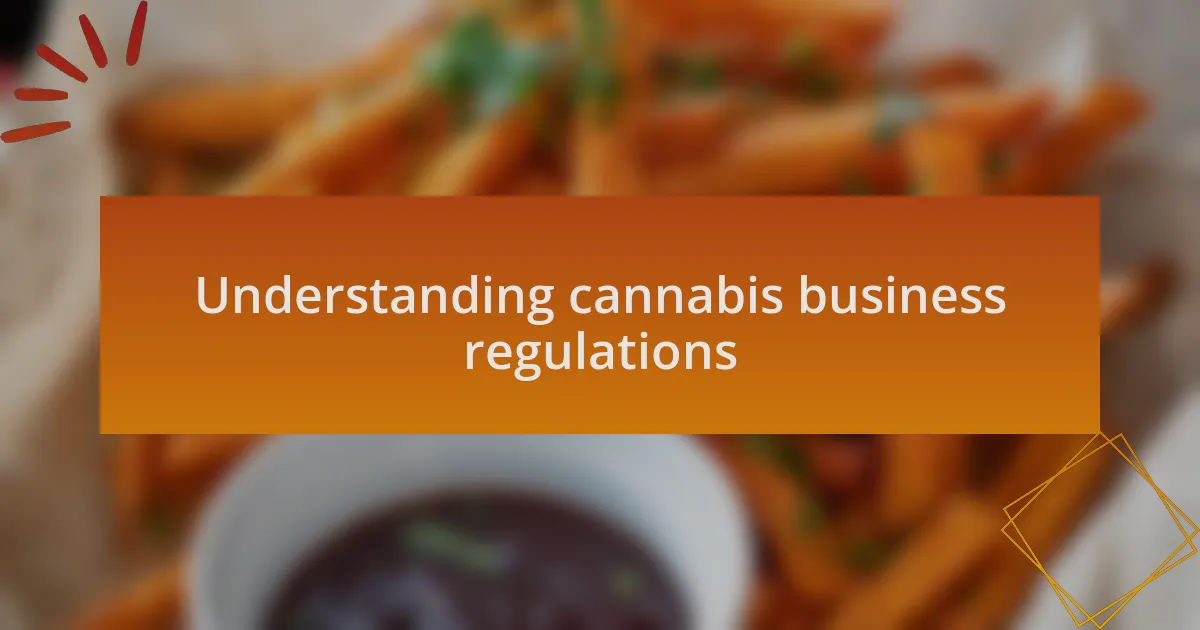
Understanding cannabis business regulations
Understanding cannabis business regulations can feel like navigating a complex maze. When I first started, I was overwhelmed by the rules in my state—each one seemed to conflict with the last. It made me wonder: how do entrepreneurs even get started in such a convoluted landscape?
While researching, I discovered that regulations vary significantly from one place to another. In some areas, simply submitting an application can take months, while in others, the red tape seems never-ending. During my own journey, there was a moment when I mistakenly thought I understood all the local laws, only to find out that a small compliance detail almost jeopardized my business. That experience taught me the importance of meticulous attention to every regulation.
I’ve come to realize that staying informed isn’t just about compliance; it’s about safety and sustainability in the cannabis industry. I remember attending a seminar where an experienced operator shared their mishaps with regulation oversight, and it struck me—what if I hadn’t made the effort to connect with others in the field? Building a network of informed professionals has been crucial for my own understanding and success in this ever-evolving regulatory environment.
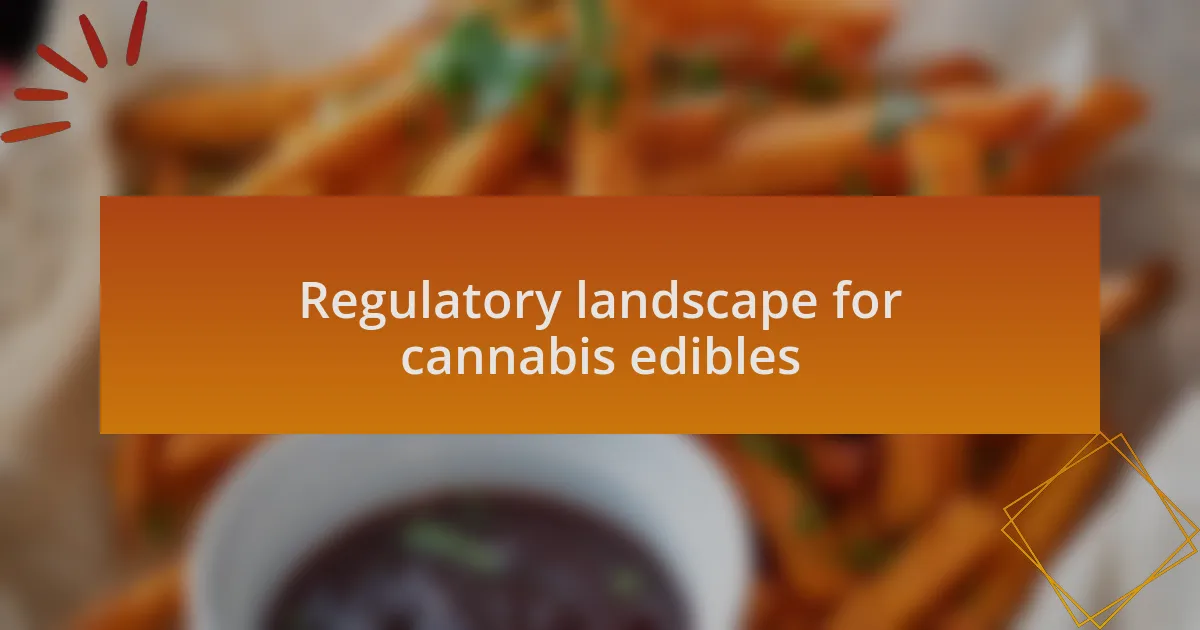
Regulatory landscape for cannabis edibles
The regulatory landscape for cannabis edibles is laden with specific guidelines that entrepreneurs must diligently follow. For instance, I vividly remember the day I learned that labeling requirements vary not only by state but also by municipality. This revelation sent me diving into regulatory documents, ensuring that each ingredient and serving suggestion complied with the local norms—an essential step I initially overlooked.
I’ve often marveled at how the complexity of these regulations can be both daunting and enlightening. Participation in local forums opened my eyes to stories from others in the industry who faced fines and setbacks due to improper compliance. Hearing their experiences made me acutely aware of the stakes involved; it was a stark reminder that one oversight, even in a seemingly benign aspect like packaging, could lead to significant financial loss.
The constant evolution of laws surrounding cannabis edibles adds another layer of challenge. As I keep my ear to the ground, I find that staying adaptable is crucial. Just last month, a new rule was implemented that mandated child-proof packaging for all edibles. I felt a rush of urgency to comply, but it also sparked an exciting opportunity to rethink my branding and make my product visually stand out while adhering to the highest safety standards. How do we embrace these changes while keeping our core mission intact? That’s the balancing act we all face in this dynamic market.
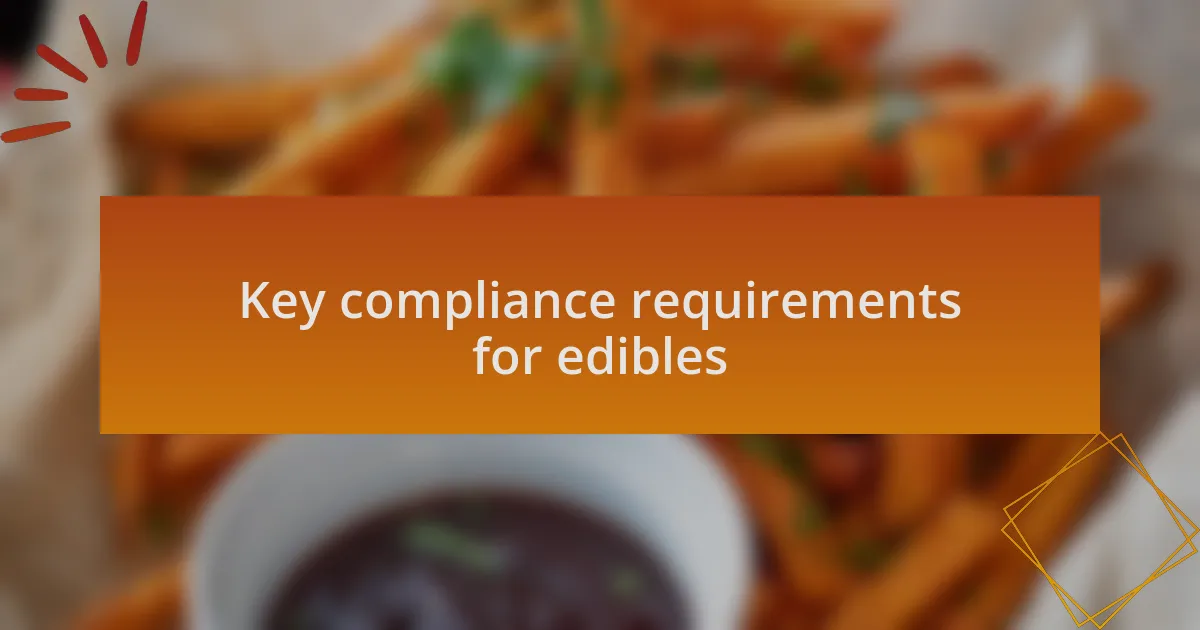
Key compliance requirements for edibles
Key compliance requirements for cannabis edibles can seem overwhelming, but I quickly learned that understanding the laws is half the battle. For instance, the necessity for accurate ingredient disclosures struck me when I faced a potential recall due to a missing allergen notice on a batch of my products. That moment taught me that transparency isn’t just about following regulations; it’s about protecting consumers and maintaining trust.
Another crucial requirement I encountered was the THC content labeling, which differs significantly among states. I remember grappling with the nuances of potency testing requirements, realizing that a minor miscalculation could lead to severe legal repercussions. This aspect reminded me of the importance of working closely with certified laboratories to ensure that every batch is accurately tested – a practice I now prioritize and advocate for.
Moreover, dosage control has been a game-changer in the landscape of cannabis edibles. I can’t stress how essential it is to provide clear dosing instructions, especially when considering the varying tolerances of consumers. Reflecting on my earlier products, where we underreported doses, I now recognize the need for precise communication to enhance both safety and user experience. After all, isn’t it our responsibility to guide consumers towards informed choices?
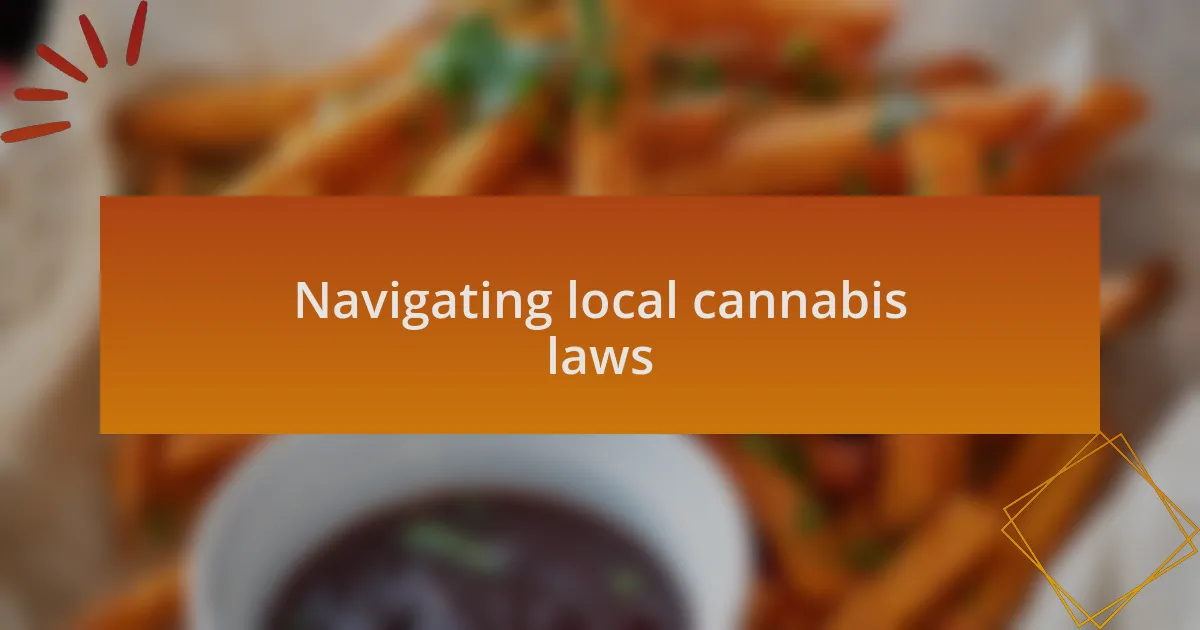
Navigating local cannabis laws
Navigating local cannabis laws can feel like walking through a maze without a map. I still remember my first encounter with local regulations when I set up my edible business. Each town had its own rules, and I found myself attending community meetings, desperately trying to make sense of what was required. It was a humbling experience that taught me the importance of local engagement and awareness.
As I delved into compliance, I faced the reality that laws could change overnight. I once received a last-minute notice about a zoning change that affected my production facility. The panic of potentially having to relocate taught me that staying connected with industry groups and legal advisors is crucial. I often hear people ask, “How can I keep up with these changes?” My answer is always to build a reliable network; it’s essential for not just surviving, but thriving in this business.
One element that struck me was the unique cultural attitudes towards cannabis in different regions. In some areas, there was a sense of acceptance, while in others, stigma still loomed large. I recently spoke with a local farmer who shared his struggles with community pushback. It made me realize that advocating for responsible cannabis use goes beyond business; it’s about fostering understanding and acceptance in our communities. How can we expect to navigate laws effectively if we don’t also bridge the gap in public perception?
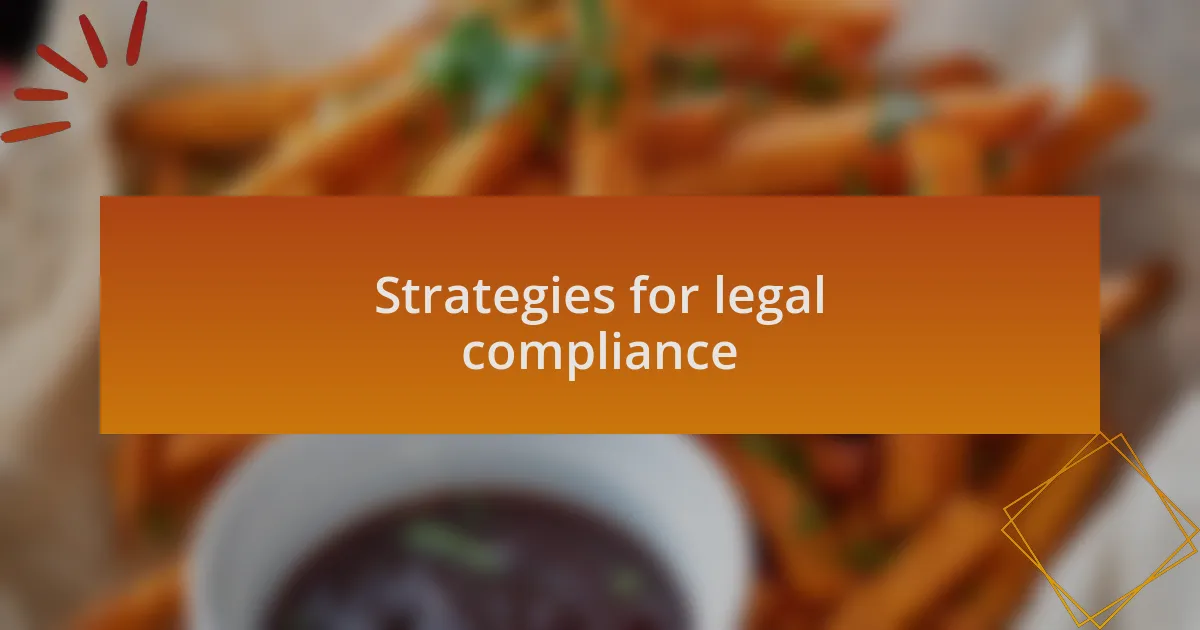
Strategies for legal compliance
Staying on top of compliance requires a proactive approach. Early in my journey, I realized that maintaining a well-organized system for tracking regulations was vital. I developed a compliance calendar to keep tabs on local, state, and federal deadlines. This tool not only helped me avoid potential pitfalls but also lessened the anxiety that came from the ever-changing landscape of cannabis laws.
I remember attending a workshop about compliance best practices, where I met other business owners facing similar challenges. Sharing our experiences was eye-opening; we found common ground in our struggles while brainstorming solutions together. Networking with peers not only broadened my understanding but also fostered a sense of community. We all asked ourselves, “Who can I call when I need help navigating these legal waters?” The answer was clear: leverage relationships built on mutual support.
Documentation is another crucial strategy that can’t be overlooked. I learned this the hard way when an unexpected audit caught me off guard. I had to scramble to produce paperwork proving my adherence to regulations. Now, I keep meticulous records and ensure my team is trained to handle compliance inquiries. It’s a lesson I wish I had learned sooner: having clear documentation can save you a lot of trouble, and it’s an essential practice that bolsters your credibility in the cannabis industry.

Lessons learned from my experience
One of the biggest lessons I learned was the importance of flexibility in my approach to compliance. When I first launched my business, I thought I had everything mapped out perfectly. However, a sudden change in state regulations threw me into a whirlwind. It was a taxing experience that prompted me to question, “What if I had been more adaptable?” Embracing flexibility allowed me to pivot when necessary, helping me navigate a rapidly evolving landscape with greater ease.
I also discovered the power of continuous education. As I delved deeper into cannabis regulations, I realized that this is not a one-time learning curve—it’s a journey. I began dedicating time each month to engage with new studies, attend webinars, and connect with experts. This ongoing commitment opened my eyes to nuances I had previously overlooked. Have you ever felt lost in a subject? That’s why I found that surrounding myself with knowledgeable voices made a significant difference, transforming confusion into clarity.
Finally, I can’t stress enough the value of building relationships with regulatory agencies. Initially, I viewed them as obstacles—entities to be feared and avoided. But as I reached out and established rapport, I discovered they were more willing to provide guidance than I had anticipated. My perspective shifted dramatically; I began to see them as partners in my success rather than adversaries. How empowering it was to know that I could pick up the phone and discuss concerns openly! This proactive communication became not just a lesson learned but a crucial part of my business strategy.